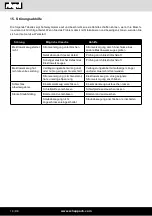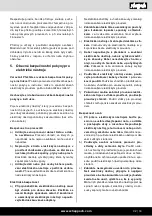
www.scheppach.com
26 |
GB
Sandpaper
Selection
1. The grain of the sandpaper is indicated on the
back. The smaller the number indicated, the
coarser the grain.
2.
Use coarse grain sandpaper for rough sanding
and fine grain sandpaper for finishing.
Sandpapers
with aluminium oxide, silicon carbide or other syn-
thetic abrasives are recommended.
3.
Start with a coarse grain and finish with the finest
grain if you have sandpaper with different grains to
choose from to achieve a good, smooth sanding
result.
Attachment and replacement
Secure the sand paper to the grinding plate with the
Velcro backing.
1. Align the sandpaper with the grinding plate and
press it on evenly.
2.
Pull the sandpaper off the grinding plate to replace
it with a new/different one (Fig. 5).
Dust extraction
Warning!
When working on lead-based paint for ex-
ample, harmful/toxic gases may be produced.
These
pose a danger both to the user and to persons in the
vicinity!
Therefore, only use this electric tool with a
dust extraction device and additionally protect yourself
and other persons in the working area with suitable
personal protective equipment!
A large amount of dust is generated when working with
this electric tool.
Dust extraction is very useful to keep
your work area clean.
An extraction system or a hoo-
ver can be connected to the extraction hose (8), which
is connected to the connection for dust extraction.
1.
Connect the vacuum cleaner adapter to a suitable
dust extraction device such as a hoover (Fig. 6-8).
Note:
Make sure that the vacuum cleaner is suitable
for use with an electric tool.
Connection to the power supply
1.
Ensure that the electric tool is switched off.
Always
switch the on/off switch (4) in the off position first
before connecting it to the power supply.
2.
Insert the mains plug into a properly installed sock-
et that meets the appropriate requirements per the
technical data.
3.
Your electric tool is now ready for use.
The specified vibration emission value can be used to
compare one power tool with another.
The specified vibration emission value can also be
used for an initial estimation of the impair.
Keep the noise level and vibration to a minimum!
•
Only use devices which are free of defects.
•
Maintain and clean the device at regular intervals.
•
Adapt your working methods to the device.
• Do not overload the device.
•
Have the device checked if necessary.
•
Switch the device off if it is not in use.
•
Wear gloves.
8.
Unpacking
•
Open the packaging and carefully remove the de-
vice.
•
Remove the packaging material, as well as the pack-
aging and transport safety devices (if present).
•
Check whether the scope of delivery is complete.
•
Check the device and accessory parts for transport
damage.
In the event of complaints the carrier must
be informed immediately.
Later claims will not be
recognised.
•
If possible, keep the packaging until the expiry of the
warranty period.
•
Familiarise yourself with the product by means of the
operating instructions before using for the first time.
•
With accessories as well as wearing parts and re-
placement parts use only original parts.
Replace-
ment parts can be obtained from your dealer.
•
When ordering please provide our article number as
well as type and year of manufacture for your equip-
ment.
m
WARNING!
The device and the packaging material are not
children’s toys!
Do not let children play with plas
-
tic bags, films or small parts!
There is a danger of
choking or suffocating!
9.
Before commissioning
Installation
•
Fold the front and rear sections together (fig. 2) and
tighten the screw nut.
(Fig. 3)
•
The longest installation length: Attach the additional
handle to the end of the machine. And then turn the
nut on the end of the machine to tighten.
(Fig. 4)
















































